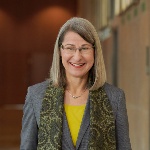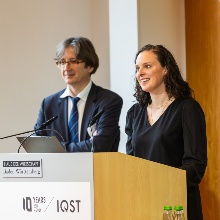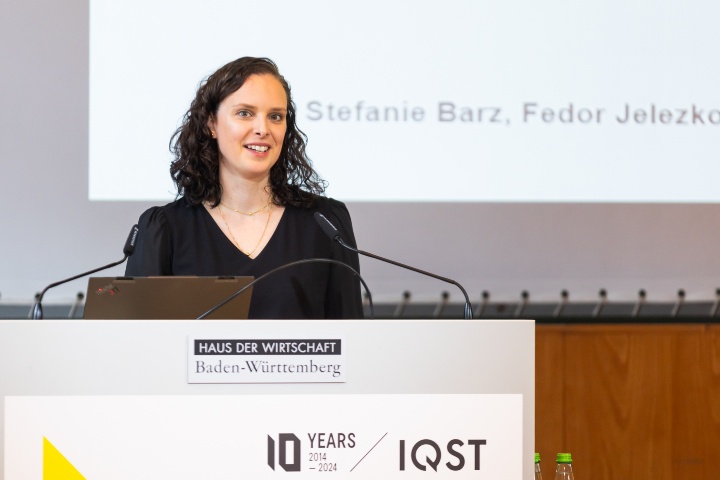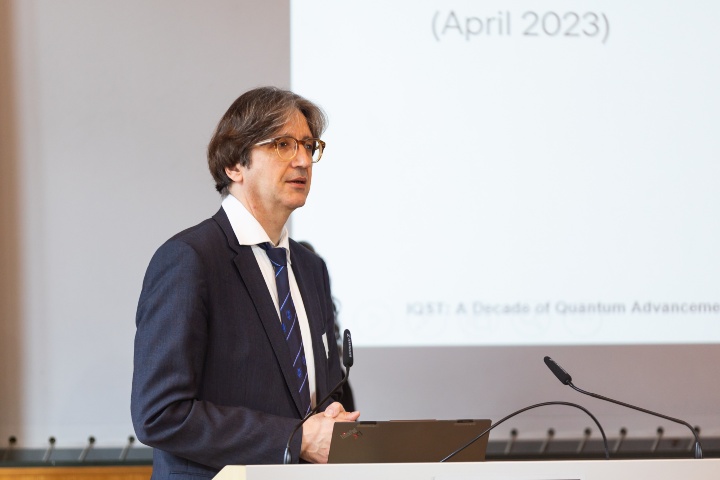The symposium brought together around 160 internationally renowned quantum experts. What was the atmosphere like?
Stefanie Barz (SB): We were pleased to host outstanding speakers from around the globe, comprising key figures from both research and industry, as well as the startup community. The program covered a wide range of topics - from basic quantum physics to quantum computing and quantum sensor technology. It was a real quantum science festival!
What role do quantum technologies play in society today?
Fedor Jelezko (FJ): While quantum phenomena remain unfamiliar to many today, they hold vast potential in many areas, including precision timekeeping, secure communication channels, and sensor technology. Just 10 years ago, quantum technology was still very much a field of basic research. In the meantime, application-oriented research and transfer to industry have gained in importance. Additionally, interdisciplinary transfer is also possible; for instance, magnetic resonance, once primarily a field of physics research, has evolved into a pivotal aspect of medical technology.
SB: The speed of development is very different across the individual fields. While we are nearing practical applications in the field of quantum sensor technology and quantum communication, it may take a bit longer for quantum computers to tackle significant problems effectively. Nevertheless, quantum technologies are still the subject of extensive research and require further exploration in terms of basic research.
The vision of the IQST was once the "comprehensive understanding of quantum technology from basic quantum physics to engineering implementation and applications." Does that still apply?
SB: Oh yes! IQST was a global pioneer, advocating for radical interdisciplinary collaboration spanning physics, engineering, computer science, biology, medicine, and beyond. We want to expand this even further, because physics alone is reaching its limits in terms of the further development of quantum technologies. In the future, we will need other disciplines, such as chemistry, to ensure the development of new approaches. Another development is the expansion of our focus from the initial Stuttgart and Ulm locations to encompass all of Baden-Württemberg. These elements are evident in the draft proposal for the "Chem4Quant" Cluster of Excellence, a collaborative endeavor involving the Universities of Stuttgart and Ulm, along with the Karlsruhe Institute of Technology (KIT), submitted as part of the Excellence Strategy.
FJ: We are also very well networked throughout Germany, for example via the Quantum Alliance. And at an international level, we work closely with the University of British Columbia in Vancouver, the University of Tokyo and the Hebrew University in Jerusalem.
What milestones were achieved during the first decade of IQST?
FJ: A notable success from the outset was our ability to establish quantum science as a strategic focal point. Building on this, many risk projects were launched by the German Research Foundation (DFG), the Federal Ministry of Education and Research (BMBF) or the European Research Council (ERC). Another milestone are our networks with large companies such as Bosch, IBM, Trumpf and Zeiss. And we have produced extremely successful start-ups. The new research infrastructures, the Center for Applied Quantum Technology (ZAQuant) in Stuttgart and the Center of Quantum Bioscience (ZQB) in Ulm, are also important. Both centers significantly bolster our competitiveness on the international stage.
And what is planned for the next decade?
SB: The future strategy of IQST centers around three core questions. First: Asking New Questions: This entails comprehending quantum systems at the intersection of disciplines, spanning from quantum physics and novel materials to innovative integrated devices. Secondly: Finding new solutions: We want to use approaches from quantum sensor technology and quantum computing to solve major social problems - from medicine to energy-efficient processes or new materials for greater sustainability. And thirdly, creating a 'quantum-ready' society: The aim is to raise public awareness of quantum technology and the unique possibilities it presents. At the same time, we see ourselves as a mouthpiece for industry, politics and society. We also want to develop new study programs. The term "integrated" signifies the fusion of diverse disciplines and, to some extent, the creation of an ecosystem that collectively addresses fundamental research, applied research, and societal advancements. This encapsulates the essence of IQST, and we remain dedicated to fostering this approach.
14 I 80+ I 1000+
The IQST was founded in 2014 on the initiative of Professors Wolfgang Schleich (University of Ulm) and Tilman Pfau (University of Stuttgart). The Max Plack Institute for Solid State Research (MPI-FKF) in Stuttgart was also involved from the beginning. The aim of the IQST is to use synergies between physics, chemistry, engineering and biosciences to improve our understanding of nature and to develop innovative technologies based on quantum physics. Since its foundation, the IQST has produced 14 ERC projects, more than 80 doctoral projects and over 1000 publications.

Jutta Witte
Dr.Scientific Consultant




